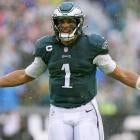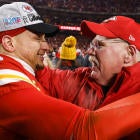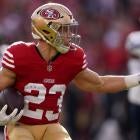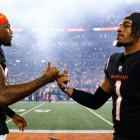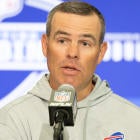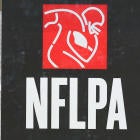Thursday night's preseason finales are the final chance for players on the roster bubble to a make a favorable impression. Bubble players will get an extended look because very few starters and key reserves will be risking injury playing in an exhibition contest that's relatively meaningless for them. NFL teams are required to reduce rosters to a maximum of 53 players by 4 p.m. ET on Sept. 1.
The roster cut down is an incredibly stressful time, especially for players in tenuous situations. Cut downs can signify the end of careers for some veteran players, particularly older ones, who can be vulnerable during cut downs because versatility and financial consideration are sometimes pivotal factors in roster decisions. Seasoned veterans are at a disadvantage for these roster spots because playing special teams is usually a necessity for those composing the back end of a roster. Backup older players have limited utility unless making a significant contribution to the offense or defense (i.e.: pass-rushing specialist, nickel defensive back, third-down receiver, etc.). Typically, they haven't been mainstays on special teams since early in their careers before becoming starters.
Availability can sometimes be the best ability. Injuries can take players who could have solidified a roster spot if healthy into potential cuts. In other words, the old adage of "you can't make the club in the tub" can be applicable.
Teams will attempt to trade players who could generate interest from other teams because of a pressing need before they are released. The trade efforts usually aren't successful. Other teams know these players are likely to be available shortly without requiring anything in return. For example, the Bears couldn't find any takers for offensive guard Earl Watford before letting him go after their third preseason game.
Only the current year's proration of the salary components that are treated like a signing bonus count toward the salary cap when players are released or traded after June 1. The bonus proration in future contract years is delayed until the following season, which is 2019 for any player released during cut downs. The delay does apply to salary guarantees. Any guarantees from future contract years accelerate into the current year when a player is released. A salary-cap charge for a player that is no longer on a team's roster is commonly referred to as dead money.
Desperately wish you had a 30-minutes-or-so, daily NFL podcast in your podcast app every morning by 6 a.m.? Put some Pick Six Podcast in your life and join Will Brinson as he breaks down the latest news and notes from around the league, as well as the win totals on a team-by-team schedule. It's a daily dose of football to get you right for that commute or gym trip. Subscribe: via iTunes | via Stitcher | via TuneIn | via Google Play
Here's a look at 10 notable veteran players that may not survive Saturday's cut downs and the salary cap implications if they are released.
2018 Salary Cap Number: $1.1 million
2018 Compensation: $1.1 million
2018 Dead Money: $100,000
2018 Salary Cap Savings: $1 million
Griffin's chances of making the Ravens were put in jeopardy when 2016 Heisman Trophy winner Lamar Jackson was taken at the end of the first round of this year's NFL Draft (32nd overall). The Ravens have carried two quarterbacks the last few years. Griffin's comeback -- after sitting out the 2017 season primarily due to a lack of interest from NFL teams -- has been successful enough to make keeping three quarterbacks a serious consideration. Remaining in Baltimore may have more to do with the comfort level in Jackson, who is a work in progress, should something happen to starter Joe Flacco. Jackson had his best outing against the Dolphins during the last preseason game. Coach John Harbaugh called it Jackson's breakout performance. Griffin shouldn't have too much trouble getting a job with another team if the Ravens don't keep him and can't pick up a conditional late-round draft pick in a trade.
2018 Salary Cap Number: $2,968,750
2018 Compensation: $3 million
2018 Dead Money: $375,000 (Third Day of League Year roster bonus)
2018 Salary Cap Savings: $2,593,750
McCourty getting traded from the Browns to the Patriots was one of the offseason's feel-good stories because of the prospect of him playing in the same secondary as his twin brother Devin, a long-time fixture at free safety. He may not get the chance because of New England's young cornerbacks developing. McCourty saw some brief action at safety for the first time in his football career during New England's last preseason contest against Panthers. Demonstrating versatility could increase his chances of sticking with the Patriots.
2018 Salary Cap Number: $2,584,447
2018 Compensation: $1,311,482 (fully guaranteed base salary)
2018 Dead Money: $3,184,447 (includes $600,000 2019 salary guarantee)
2019 Dead Money: $1,272,965
2018 Salary Cap Savings: $600,000 Increase
Lynch, whom the Broncos traded up to select with the 26th-overall pick in the 2016 draft, has fallen out of favor in Denver. He never could unseat Trevor Siemian, who was dealt to the Vikings during the offseason, as starting quarterback when given every opportunity last preseason. Lynch went into training camp as the top backup to free-agent signee Case Keenum but has been outplayed by Chad Kelly, the last pick in the 2017 draft. Once Lynch was demoted to third string after the first preseason game, it didn't take long for Broncos president of football operations and general manager John Elway to mention that adding a more veteran presence to pair with Kelly as Keenum's backups was a possibility.
2018 Salary Cap Number: $2,769,878
2018 Compensation: $1,622,091
2018 Dead Money: $1,797,272 (includes $649,985 training camp roster bonus)
2018 Salary Cap Savings: $972,606
The wholesale changes at wide receiver during free agency were an indictment of the 2015 first-round pick. John Brown, Michael Crabtree and Willie Snead were signed. The Ravens passed on their fifth-year option for Perriman in 2019 (worth $9.387 million) because of a disappointing and injury-plagued first three years. Jaleel Scott and Jordan Lasley were also taken in the fourth and fifth rounds of this year's draft. Nonetheless, the Ravens paid Perriman a $649,485 roster bonus that was due on the third day of training camp instead of releasing him. Scott going on injured reserve with a hamstring injury opens up a roster spot, but Perriman doesn't play special teams, which is usually a necessity for wide receiver who isn't expected to figure prominently in the passing game.
2018 Salary Cap Number: $1,322,404
2018 Compensation: $1,001,745
2018 Dead Money: $125,000
2018 Salary Cap Savings: $876,745
Additions at running back have put Adullah on the hot seat, which he recognizes. If Adullah had been revitalizing Detroit's rushing attack like expected when he was taken in the second round of the 2015 draft, LeGarrette Blount and Kerryon Johnson wouldn't have been brought respectively during the free agency and the draft. Theo Riddick seems firmly entrenched as the pass catching third down running back. That leaves Adullah fighting with DeWayne Washington and Zach Zenner for the fourth running back spot. Adullah has been given a chance to return kicks in the preseason, which is something he did well as a rookie. In 2015, he second in the NFL with 29.1 yard average on 37 kickoff returns.
2018 Salary Cap Number: $2 million
2018 Compensation: $2 million
2018 Dead Money: $600,000
2018 Salary Cap Savings: $1.4 million
It was assumed that the 42 year old would be Houston's punter for a sixth-straight year when he signed a one-year, $2 million deal in March. 2018 undrafted free agent Trevor Daniel is surprisingly giving Lechler a run for his money. Both have punted six times in preseason games. Daniel's gross and net averages per punt are 48.3 and 44.8 yards, while Lecher is at 43.8 and 38.8 yards. The financial equation heavily favors Daniel. His entire three-year, $1.712 million contract is about $300,000 less than Lechler's 2018 salary.
2018 Salary Cap Number: $4,860,938
2018 Compensation: $4.95 million
2018 Dead Money: $4.475 million
2018 Salary Cap Savings: $385,938
San Francisco's right guard situation has been fluid. Cooper was penciled in as the starter after signing a one-year, $4.95 million contract with $4 million guaranteed ($2 million as a signing bonus and $2 million as a base-salary guarantee). The 2013 seventh-overall pick started a career-high 13 games for the Cowboys after washing out with the Cardinals, who drafted him, Patriots and Browns. Joshua Garnett, a 2016 first-round pick who missed last year with a right-knee injury, was thought to potentially be vulnerable when Cooper signed because he isn't necessarily an ideal fit for coach Kyle Shanahan's offense. Mike Person, who signed a one-year deal for his league minimum in May after the NFL draft, has the inside track to start. Cooper has fallen behind both because of his slow recovery from offseason knee surgery. He sprained the MCL in his left knee late last season. Slightly over $42 million in salary cap space gives the 49ers the ability to eat Cooper's salary if necessary. Both Garnett and Cooper could be safe with Erik Magnuson out several weeks because of a hamstring injury. Magnuson could be headed for injured reserve.
2018 Salary Cap Number: $2,181,250
2018 Compensation: $2.4 million
2018 Dead Money: None
2018 Salary Cap Savings: $2,181,250
Gillislee was signed to a front-loaded two-year, $6.4 million offer sheet as a restricted free agent in 2017, which the Bills didn't match, to take over for LeGarrette Blount as New England's power running back. He was inactive on game day for almost all of the second half of the 2017 season and during the playoffs. Jeremy Hill was brought in on a one-year, $1.5 million deal in free agency to compete with Gillislee for the bigger running back role. He appears to be winning the battle. During the preseason, Hill has gained 107 yards on 26 rushing attempts while Gillislee has 33 carries for 100 yards.
2018 Salary Cap Number: $1 million
2018 Compensation: $1 million
2018 Dead Money: $100,000
2018 Salary Cap Savings: $900,000
Manuel and Connor Cook shouldn't get too comfortable with Raiders coach Jon Gruden commenting after the last preseason game that he doesn't know if his backup quarterback is on the roster. If the quarterback rotation against the Packers is any indication, the 2013 first-round pick would be the first to go. Cook relieved starter Derek Carr in the first quarter. Manuel didn't play until the second half.
2018 Salary Cap Number: $2,031,250
2018 Compensation: $1.75 million ($500,000 base salary guarantee)
2018 Dead Money: $1.125 million (includes salary guarantee and $250,000 Third Day of League Year roster bonus)
2018 Salary Cap Savings: $906,250
What a difference a year makes. Warmack made such a good impression after signing a one-year prove it deal when free agency started that he was given a one-year, $2.5 million extension at the end of the preseason. This year, 2018 seventh-round pick Jordan Mailata, an Australian rugby player making the transition to football as an offensive lineman, could play a part in the 2013 first-round pick's undoing in Philadelphia. Since Mailata is beginning to show some potential, the Eagles may not want to take the risk of exposing him to other teams through the waiver wire.


































